C1qTNF5 Monoclonal / Alexa Fluor 647 / 332923
Product Details
| Description | Human C1qTNF5 Alexa Fluor 647-conjugated Antibody | |
|---|---|---|
| Conjugate | Alexa Fluor 647 | |
| Clone | 332923 | |
| Target Species | Human | |
| Applications | ICS | |
| Supplier | R&D Systems | |
| Catalog # | Sign in to view product details, citations, and spectra | |
| Size | ||
| Price | ||
| Antigen | ||
| Host | ||
| Isotype |
About C1qTNF5
This gene encodes a member of a family of proteins that function as components of basement membranes and may play a role in cell adhesion. Mutations in this gene have been associated with late-onset retinal degeneration. The protein may be encoded by either a bicistronic transcript including sequence from the upstream membrane frizzled-related protein gene (MFRP), or by a monocistronic transcript expressed from an internal promoter. [provided by RefSeq, Jun 2013]
This gene encodes a member of a family of proteins that function as components of basement membranes and may play a role in cell adhesion. Mutations in this gene have been associated with late-onset retinal degeneration. The protein may be encoded by either a bicistronic transcript including sequence from the upstream membrane frizzled-related protein gene (MFRP), or by a monocistronic transcript expressed from an internal promoter. [provided by RefSeq, Jun 2013]
About Alexa Fluor 647
Alexa Fluor™ 647 (AF647, Alexa 647) has an excitation peak at 650 nm and an emission peak at 665 nm, and is spectrally similar to Cy®5 (GE Healthcare), iFluor® 647 (ATT Bioquest), and DyLight™ 650 (Thermo Fisher Scientific). Alexa 647 is commonly used for flow cytometry, microscopy, super-resolution microscopy applications. It is very bright, photostable, and pH insensitive, all of which contribute to sensitive detection while using this dye.
Alexa Fluor™ 647 (AF647, Alexa 647) has an excitation peak at 650 nm and an emission peak at 665 nm, and is spectrally similar to Cy®5 (GE Healthcare), iFluor® 647 (ATT Bioquest), and DyLight™ 650 (Thermo Fisher Scientific). Alexa 647 is commonly used for flow cytometry, microscopy, super-resolution microscopy applications. It is very bright, photostable, and pH insensitive, all of which contribute to sensitive detection while using this dye.
Experiment Design Tools
Panel Builders
Looking to design a Microscopy or Flow Cytometry experiment?
Validation References
Reviews & Ratings
| Reviews |
|---|
Looking for more options?
152 C1qTNF5 antibodies from over 15 suppliers available with over 32 conjugates.





